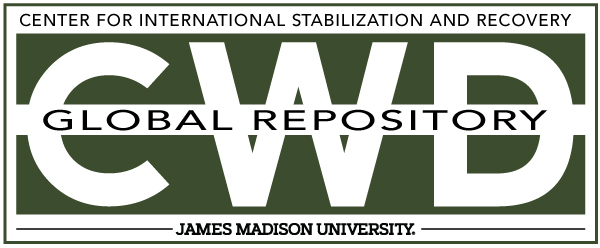Document Type
Article
Creative Commons License

This work is licensed under a Creative Commons Attribution-Noncommercial-No Derivative Works 4.0 License.
Publication Date
2-2020
Keywords
Risk Education, Arnoud Loman, Uppsala University, Behaviour Change, Explosive Hazards, Humanitarian Mine Action, HMA, KAP, Knowledge, Mine Risk Education, Syria
Abstract
The extensive use of mines and explosives in Syria pose a threat on all the lives of the conflict-affected population. To ensure that the population has the necessary knowledge and skills to protect themselves from this existing threat, diverse humanitarian mine action organisations, including [organisation X], design and implement mine risk education (MRE) activities. However, the number of beneficiaries reached with MRE alone does not adequately reflect the impact of the activities. There is a lack of data whether these achievements enhance the well-being of the people in communities that are affected by explosive hazards, especially in the ongoing conflict in Syria. Using the work of [organisation X] as a single case study, the objective for this thesis is therefore to assess to what extent the MRE activities of [organisation X] have increased the knowledge of explosive hazards and influenced positive behavioural change among their beneficiaries. 8.267 surveys have been gathered between 2016 and 2018 that examine the beneficiaries in the north-west and south of Syria both before (pre) and after (post) the risk education on knowledge of explosive hazards and to a limited extent on practices.
Overall, the findings of the pre and post survey show an increase in the knowledge among the beneficiaries as a direct causation of the MRE. This is affirmed by the applied paired-samples t-tests that suggest a significant difference between the levels of knowledge of the beneficiaries pre and post the risk education of [organisation X]. Based on the conceptual KAP framework and the assumption of a direct relationship between knowledge, attitudes and practices, the increased knowledge will most likely also lead to an increase in practices among the surveyed population. However, it should be emphasized that knowledge is only one component of positive behavioural change, meaning that challenges remain to ensure that the acquired knowledge is translated into the right practices.
[Organisation X] is a humanitarian mine action organisation that actively operates in Syria. However, due to security concerns, the organisation is operating anonymously. For reasons of confidentiality, the name of [organisation X] is not mentioned in this thesis.
Included in
Defense and Security Studies Commons, Peace and Conflict Studies Commons, Public Policy Commons, Social Policy Commons



